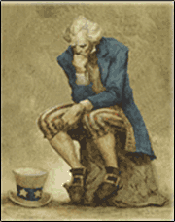
–>
August 13, 2022
I started getting texts Friday morning from people on the scene at the Chautauqua Institution in Western New York, one from my sister-in-law, an ER nurse at a nearby hospital: “Salman Rushdie was stabbed at Chautauqua, flown to Erie, could not get bleeding stopped.” I know the area well. I have a summer home in Chautauqua (pronounced sha-TAWK-wa.) County, the site of my 2000 novel, the then futuristic 2006: The Chautauqua Rising.
‘); googletag.cmd.push(function () { googletag.display(‘div-gpt-ad-1609268089992-0’); }); }
A celebrated writer, the 75-year-old Rushdie has been living under a fatwa since February 14, 1989, the day that Iran’s Ayatollah Khomeini decided that Rushdie’s novel, The Satanic Verses, was “blasphemous against Islam.” He was a regular visitor to the Chautauqua Institution. The fact that Rushdie would be stabbed at Chautauqua is perversely and tragically ironic.

YouTube screengrab
In the way of background, a Methodist minister founded the institution on Chautauqua Lake in 1874. It served as a campground meeting for summer school teachers and proved popular enough that by century’s end, traveling “chautauquas” were bringing progressive enlightenment to citizens around the nation.
I set the climatic scene of 2006 at the institution itself. The book tells the tale of a grassroots “rising” that anticipated the Tea Party insurgency of 2009-10 and the MAGA movement of more recent years. When I wrote the book I was unaware that a quiet insurrection was brewing on the institution grounds. A group known as Chautauqua Christian Fellowship (CCF) had emerged to correct the Institution’s political and theological leftward drift.
‘); googletag.cmd.push(function () { googletag.display(‘div-gpt-ad-1609270365559-0’); }); }
The same year that my novel was published, 2000, the institution accelerated that drift by selecting the Rev. Joan Brown Campbell to be its director of religion. A longtime apologist for Fidel Castro, Campbell had made news the year before her appointment by orchestrating the forced return of Elian Gonzalez to Communist Cuba. At the time of Campbell’s retirement in 2013, one of her woke acolytes toasted Campbell, saying, “When Janet Reno is looking for someone really tough to get on the [Elian] case you have some sense of whom we are dealing with here. Don’t Mess With Joan.”
Upon her arrival at Chautauqua, Campbell embarked on two contradictory missions, one public, one private. Publicly, she championed “interfaith dialogue,” specifically an outreach to Muslims known as the “Abrahamic Initiative.” A gay-friendly Christian community with a bathing beach, an active theater scene, and a substantial Jewish population may not have seemed a natural draw for Muslims, but Brown was insistent. “We didn’t have a Muslim presence,” she told a reporter for a local newspaper, “but we knew if we wanted to talk about the Abraham link, we needed to have all three legs of the stool.” She expected resistance. “There is among the Jewish groups, and some conservative Christian groups as well, an objection to Islam,” Campbell lamented. It would, of course, take some persuasion to build a stool when two of the legs objected, but as Chautauqua was learning, “Don’t Mess With Joan.”
Privately, for all her talk of “inclusivity,” Campbell began to crack down on the CCF. Whereas the group had once been able to run its own programs freely and without interference, Campbell now limited the CCF to three speakers a year. She would vet the speakers in advance and monitor them when they spoke. In the summer of 2002, the CCF invited me to speak — one of its members had read my novel. Since I had never spoken or written about Islam, I apparently passed muster.
That same summer Campbell had invited Imam Feisal Abdul Rauf to lay the groundwork for a Muslim cultural center at Chautauqua. This was the same New Jersey slumlord who called the U.S. “an accessory to the crime” of September 11 and demanded that President George W. Bush give an “America Culpa” speech to acknowledge the harm America had done to the Islamic world. Rauf would secure his fifteen-minutes of fame in the scheme to build a mosque and community center at the site of Ground Zero, a project that, if nothing else, gave the woke an extended opportunity to spawn new “Islamophobes” and scold them.
When the CCF invited me to speak at the institution, I was not aware that Campbell had seized control or that she had started her Abrahamic stool-building. I would learn soon enough. Addressing what I called the “illiberal orthodoxy” of the media, I dedicated most of my talk to the media’s crude stereotyping of the religious right. Towards the end, I pointed out the one notable exception to the media’s anti-conservative bias. “Islamic extremists in America,” I argued, “have proven to be exactly the bogeyman that the media have long imagined the Christian right to be — patriarchal, theocratic, sexist, homophobic, anti-choice, and openly anti-Semitic.”
I then spoke of a “particularly honorable and brave” Muslim moderate named Sheik Muhammad Kabani to make the case that extremism was something of a norm. I cited his testimony that 80 percent of the mosques in America were in the hands of extremists and added that some were not above encouraging murder to get their way. Kabani, the chairman of the Islamic Supreme Council of America, had made this claim at a State Department event in 1999. His numbers came from his own eight-year study of 114 mosques.
‘); googletag.cmd.push(function () { googletag.display(‘div-gpt-ad-1609268078422-0’); }); } if (publir_show_ads) { document.write(“
Campbell had one of her minions monitor my talk and record it without my permission. She apparently did not like what she heard. Her reaction as headlined in the Chautauquan Daily — “Brown (sic) comments on Cashill statement” — was a minor masterpiece of do-gooder doubletalk. Campbell began with progressive boilerplate about the institution’s commitment to a free exchange of ideas. She then quickly segued into the inevitable caveats. One was that speakers be “respectful of the views of all.” The second was that their information be “factual.” Campbell was to be the judge of both, and an unforgiving judge she proved to be.
“Jack Cashill stepped outside the boundaries of civil discourse,” she ruled. “Several of his comments were not only provocative, but potentially harmful.” The only evidence of potential harm that Campbell mentioned was my reference to Kabani. She did not claim I misquoted him, but rather that I had taken the quote “out of the context of Kabani’s own struggle with Saudi Arabia.” In a historically Christian summer community of ten thousand with no known Muslims in residence, Campbell branded me an Islamophobe for failing to acknowledge the intramural nuances of Muslim politics. This was nuts.
“The Kabani statement feeds fear and prejudice,” Campbell claimed. “Pandering to fear through innuendo can hardly be defined as civil discourse.” I was learning what the CCF already knew: tolerance was not exactly in the woke wheelhouse.
In Rushdie’s previous appearances, both to appease Campbell and to protect his own life, he was careful to stay inside the Institution’s “boundaries of civil discourse.” His cautions protected him from the wrath of the institution, but tragically, alas, they could not protect him from the wrath of the world beyond its gates.
For more about Jack Cashill, see www.Cashill.com.
<!– if(page_width_onload <= 479) { document.write("
“); googletag.cmd.push(function() { googletag.display(‘div-gpt-ad-1345489840937-4’); }); } –> If you experience technical problems, please write to [email protected]
FOLLOW US ON
<!–
–>
<!– _qoptions={ qacct:”p-9bKF-NgTuSFM6″ }; ![]() –> <!—-> <!– var addthis_share = { email_template: “new_template” } –>
–> <!—-> <!– var addthis_share = { email_template: “new_template” } –>






